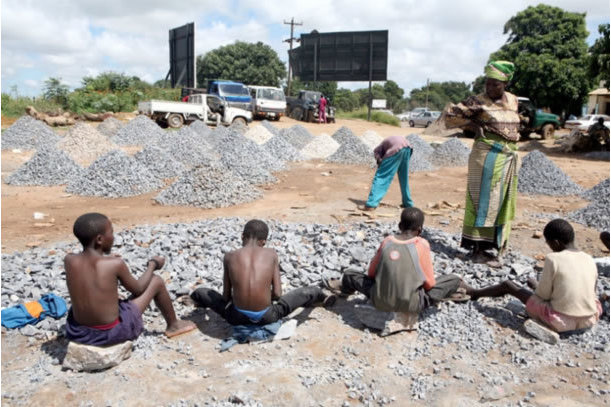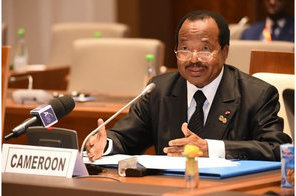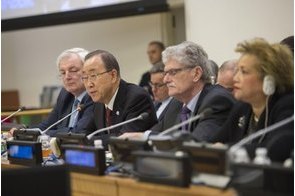Study reveals increase in modern day slavery

Summary
Forced labour is predominantly within the domestic sector in Nigeria.
An estimated 45.8 million men, women and children around the world are today trapped in modern slavery - 28% more than previously estimated. They are enslaved through human trafficking, forced labour, debt bondage, forced or servile marriage or commercial sexual exploitation. This is revealed in the 2016 Global Slavery Index, the flagship research report published today by the Walk Free Foundation.
North Korea is the country with the greatest prevalence of modern slavery, with 4.37% of its population estimated to be enslaved. It is also the country with the weakest government response in terms of actions taken to combat modern slavery. The next highest prevalence of slavery is found in Uzbekistan (3.97%), followed by Cambodia (1.65%).
In terms of absolute numbers, India remains the highest with an estimated 18.35 million enslaved people, followed by China (3.39m), Pakistan (2.13m), Bangladesh (1.53m) and Uzbekistan (1.23m). Combined, these five countries account for almost 58% of the world’s enslaved, or 26.6 million people.
The 2016 Global Slavery Index estimates that 28% more people are enslaved than reported in the 2014 edition. This significant increase is due to enhanced data collection and research methodology. Survey research for the 2016 Global Slavery Index included over 42,000 interviews conducted in 53 languages across 25 countries, including 15 state-level surveys in India. These representative surveys cover 44% of the global population.
Sub-Saharan Africa accounted for approximately 13.6% (6,245,800) of the world's total enslaved population. Within the region, the Democratic Republic of the Congo, Sudan, South Sudan, Somalia, and the Central African Republic have the highest prevalence of modern slavery (all 1.13%). As evident from surveys conducted in Ghana, Nigeria, South Africa and Ethiopia by Walk Free Foundation, slavery in Sub-Saharan Africa takes the form of forced labour and forced marriage. In Ghana, survey results suggest that there are an estimated 103,300 people enslaved in that country, of which 85% are in forced labour, and 15% are in forced marriage. For forced labour, the main industries of concern are farming and fishing, retail sales and then manual labour and factory work. In Nigeria, survey results suggest that forced labour is predominantly within the domestic sector, although it was impossible to survey in three regions due to high conflict. In South Africa, the industries most reported in the survey include the commercial sex industry, manual labour industries such as construction, manufacturing and factory work, and drug trafficking.
In Mauritania, the national survey revealed that 1.06% of the population are in some form of modern slavery. This is a substantial decrease from previous estimates, but a finding closer to the true figure due to the higher level of rigor in random sample surveys. While Mauritania has been the focus of extensive interest and reporting in the past, it has not had the benefit of a national survey until now. The extent of slavery in Mauritania is still high, however more reliable methods indicate that it is not as high as previously thought.
Government response
The Global Slavery Index also tracks government actions and responses to modern slavery. Of the 161 assessed, 124 countries have criminalised human trafficking in line with the UN Trafficking Protocol and 96 have developed national action plans to coordinate government response. The governments leading the charge against modern slavery are The Netherlands, the United States of America, the United Kingdom, Sweden, Australia, Portugal, Croatia, Spain, Belgium and Norway.
Some significant progress has been made by many governments since the publication of the 2014 report. The UK Government introduced the Modern Slavery Act 2015 and has appointed an Independent Anti-Slavery Commissioner, Mr Kevin Hyland. President Barack Obama closed a loophole in US law to now ban the importation of goods made with forced or child labour.
Countries such as Croatia, Montenegro, Brazil, Macedonia, the Philippines, Georgia, Moldova, Albania and Jamaica are taking positive steps to respond to modern slavery relative to their wealth.
While India has more people enslaved than any other country, it has made significant progress in introducing measures to tackle the problem. It has criminalised trafficking, slavery, forced labour, child prostitution and forced marriage. The Indian government is currently tightening legislation against human trafficking, with tougher punishment for repeat offenders. It will offer victims protection and recovery support.
Call to action
Mr. Andrew Forrest, Chairman and Founder of Walk Free Foundation, said eradicating slavery makes sense, morally, politically, logically and economically, and called on the governments of the world’s leading economies to provide an example to others by enacting and implementing robust anti-slavery measures.
“We call on governments of the top 10 economies of the world to enact laws, at least as strong as the UK Modern Slavery Act 2015, with a budget and capability to ensure organisations are held to account for modern slavery in their supply chains, and to empower independent oversight. Leaders of the world’s major economies must bring the power of business to this issue, by requiring a focus on supply chain transparency.”
“I believe in the critical role of leaders in government, business and civil society,” Mr Forrest said. “Through our responsible use of power, strength of conviction, determination and collective will, we all can lead the world to end slavery.”
Mr. Forrest emphasised the key role that business needs to play in eradicating slavery: “Businesses that don’t actively look for forced labour within their supply chains are standing on a burning platform. Business leaders who refuse to look into the realities of their own supply chains are misguided and irresponsible.”
Related
-
Amnesty accuses Cameroon of human rights violations in Boko Haram counterinsurgency
Amnesty International said up to eight people die in detention each month from disease, torture and malnutrition.
-
Amnesty warns on EU-Africa Summit on border controls
Amnesty International is calling on EU leaders to increase safe and legal routes to Europe, including through resettlement, ...
-
Group calls for renewed action and investment in humanity ahead of UN summit
The first-ever World Humanitarian Summit is a call to action to reduce human loss and suffering.









